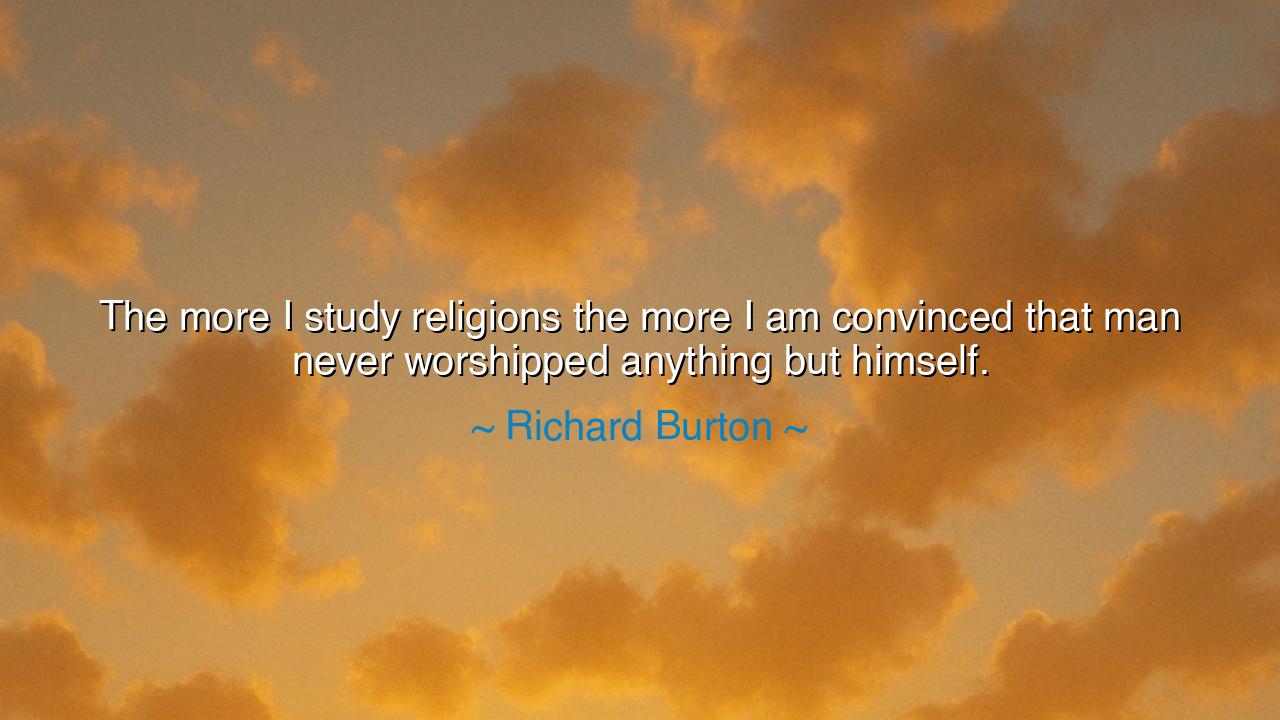
The more I study religions the more I am convinced that man never
The more I study religions the more I am convinced that man never worshipped anything but himself.






“The more I study religions the more I am convinced that man never worshipped anything but himself.” Thus spoke Sir Richard Francis Burton, the wanderer of deserts, the translator of forbidden books, the seeker who crossed the boundaries of creed, culture, and civilization. In these words, he offered a reflection as daring as his own spirit—a mirror held up to the ages of faith and philosophy. To some, this statement may sound cynical; yet beneath it lies a profound and unsettling truth: that the gods we worship, the temples we build, and the rituals we keep often reveal not the nature of the divine, but the image of man himself.
Burton’s insight was not born from irreverence, but from observation. He was a scholar of the human heart, a pilgrim who studied the faiths of the world not from afar, but from within. He had prayed with the Muslims in Mecca, studied Sanskrit in India, walked with Sufi mystics, and listened to Christian hymns in the cathedrals of Europe. And in every faith he saw the same truth reflected: humanity projects its own virtues, fears, and longings onto the heavens. When man envisions his gods, he does not imagine the wholly alien or the unknowable; he imagines the perfected version of himself—wise, powerful, merciful, or wrathful, according to his own heart. Thus, religion, in its outer form, becomes a mirror of man’s inner world.
To say that “man never worshipped anything but himself” is not to deny the divine, but to reveal the human lens through which the divine is seen. The gods of every age bear the faces of their believers. The Greeks worshipped Zeus, a being majestic yet flawed, quick to anger and love—a reflection of the heroic and passionate human soul. The Norse revered Odin, a wanderer and seeker of knowledge—an image of the restless intellect. Even in monotheistic faiths, where God transcends form, man clothes Him in the garments of his own understanding: the just judge, the merciful father, the avenger of wrongs. In worshipping these images, humanity reaches for the infinite, but often encounters its own reflection gazing back.
Yet, let us not mistake Burton’s wisdom for scorn. There is, hidden in his words, a paradoxical reverence for humanity itself. For if man, in his yearning, creates gods in his own image, it is because something divine stirs within him. His ability to conceive of justice, beauty, and compassion—and to project them heavenward—reveals that he is, in truth, a vessel of the sacred. When a child draws a picture of the sun, the sun itself is not contained in the drawing, but its light is there. So it is with religion: though human hands shape the idols, the light of the divine still shines through the cracks. Burton, in his deep worldliness, perceived that religion, at its core, is man’s dialogue with his better self—his attempt to rise above the beast within and touch the stars.
History offers us many examples of this truth. Consider the pharaohs of Egypt, who were worshipped as living gods. They built monuments to eternity, not merely to honor divinity, but to immortalize their own power. Yet those same pyramids stand today as symbols of mankind’s longing for permanence, for transcendence, for a connection with what endures beyond death. The worship of kings, of heroes, of saints—these are all reflections of man’s desire to believe that something within him partakes of eternity. Even the atheist, who bows to no god, often worships knowledge, reason, or freedom—still the creations of the human spirit. In every age, man’s worship reveals his essence: he cannot help but seek what he already carries within.
The origin of Burton’s statement lies in his lifelong fascination with faith’s universality. Having witnessed the sacred in many forms, he saw how religions differ in ritual but converge in purpose—to explain existence, to anchor morality, to comfort the fearful heart. What he found most striking was not the diversity of gods, but their sameness in nature: gods who love and hate, who demand and forgive, who create and destroy. To Burton, this was evidence that religion, rather than descending from heaven, rose from the depths of the human soul—a testament to man’s creative and spiritual power.
The lesson in Burton’s words is not to reject faith, but to understand it. Let each person recognize that their worship, whatever its form, is a reflection of their inner world. The wise do not despise this; they use it to grow. To know that your gods are shaped by your own heart is to take responsibility for the state of that heart. If your vision of the divine is wrathful, seek peace within yourself. If your god is loving and compassionate, nurture that same love in your dealings with others. The outer temple mirrors the inner soul; to purify one is to sanctify the other.
So, my child of questioning spirit, remember this: the divine you seek in the heavens is already alive within you. Worship not blindly, but consciously; revere not out of fear, but out of understanding. See in your faith a mirror, and polish it until it reflects not only your own image, but the image of the eternal truth beyond yourself. For though, as Burton said, man may have never worshipped anything but himself, the self—when purified by love, wisdom, and humility—becomes a doorway to God.






AAdministratorAdministrator
Welcome, honored guests. Please leave a comment, we will respond soon